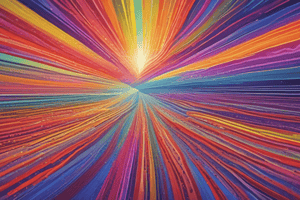Podcast
Questions and Answers
What type of light can humans see?
What type of light can humans see?
- Visible light (correct)
- Ultraviolet light
- Infrared light
- Gamma rays
What causes the sky to appear blue on a sunny day?
What causes the sky to appear blue on a sunny day?
- The presence of blue-colored gases in the atmosphere
- The reflection of blue light from the ocean
- The combination of all wavelengths of light
- The scattering of blue wavelengths by air molecules (correct)
How fast does light travel?
How fast does light travel?
- Roughly 500,000 kilometers per second
- Approximately 400,000 kilometers per second
- Almost 200,000 kilometers per second
- About 300,000 kilometers per second (correct)
Which colors are considered primary colors of light?
Which colors are considered primary colors of light?
What happens to light wavelengths when we see a red apple?
What happens to light wavelengths when we see a red apple?
What is the term for the change in color of the sky during sunset?
What is the term for the change in color of the sky during sunset?
Which type of light can some insects detect that humans cannot?
Which type of light can some insects detect that humans cannot?
What is created when all colors of light are combined?
What is created when all colors of light are combined?
How long does sunlight take to travel from the sun to the Earth?
How long does sunlight take to travel from the sun to the Earth?
What happens to starlight as it travels to Earth?
What happens to starlight as it travels to Earth?
Flashcards
What is light?
What is light?
Light is a form of energy that allows us to see things. It travels in straight lines and is made up of electromagnetic radiation.
What is visible light?
What is visible light?
Visible light is the portion of the electromagnetic spectrum that humans can see. It's the type of light that we use to see colors.
What are ultraviolet and infrared light?
What are ultraviolet and infrared light?
Ultraviolet and infrared are types of electromagnetic radiation that humans cannot see because their wavelengths are beyond the range that our eyes can detect.
How fast does light travel?
How fast does light travel?
Signup and view all the flashcards
How do we see colors?
How do we see colors?
Signup and view all the flashcards
What are the primary colors of light?
What are the primary colors of light?
Signup and view all the flashcards
What are the secondary colors of light?
What are the secondary colors of light?
Signup and view all the flashcards
What happens when all colors of light are combined?
What happens when all colors of light are combined?
Signup and view all the flashcards
Why is the sky blue?
Why is the sky blue?
Signup and view all the flashcards
Why does the sunset appear orange or red?
Why does the sunset appear orange or red?
Signup and view all the flashcards
Study Notes
What is Light?
- Light is a form of electromagnetic energy vital for sight.
- Sunlight is a primary source of light.
- Light travels in a straight line.
- Visible light is only a portion of the electromagnetic spectrum.
Types of Light
- Humans can only see a small range within the light spectrum called visible light.
- There are other types of light, including ultraviolet and infrared, humans cannot see.
- Insects have the ability to see infrared light.
Speed of Light
- Light travels extremely fast (almost 300,000 kilometers per second or 186,000 miles per second).
- It takes approximately 8 minutes for sunlight to reach Earth.
- Light from distant stars may have already ceased to exist before it reaches the Earth.
Colors of Light
- Visible light is made up of various wavelengths that correspond to different colours.
- Three primary colors are red, green and blue.
- Mixing these colors generates secondary colors: yellow, cyan, and magenta.
- White light is created when all colors combine.
Why the Sky is Blue
- The atmosphere is composed of tiny particles called molecules.
- Sunlight's shorter wavelengths (blue light) are scattered more effectively by these molecules than longer wavelengths (like red).
- This scattering phenomenon is why we see a blue sky.
Why the Sunset is Red/Orange
- As the sun sets, the light has to travel through more of the atmosphere.
- The blue light is scattered away.
- The longer wavelengths (red and orange) are more prominent, causing a reddish or orange sunset.
Studying That Suits You
Use AI to generate personalized quizzes and flashcards to suit your learning preferences.



